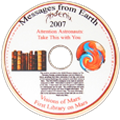
 The SFFaudio Podcast #125 – The Horla by Guy de Maupassant, read by Gregg Margarite (of LibriVox), followed by a discussion of the story – participants include Jesse, Tamahome and Jenny Colvin (of the Reading Envy blog).
The SFFaudio Podcast #125 – The Horla by Guy de Maupassant, read by Gregg Margarite (of LibriVox), followed by a discussion of the story – participants include Jesse, Tamahome and Jenny Colvin (of the Reading Envy blog).
Talked about on today’s show:
“c’est magnifique!”, is this Jesse’s favourite story from the 19th century?, H.G. Wells, is The Horla Science Fiction, aliens, ghosts, Guy de Maupassant is crafting our feeling on how the story should be interpreted, Mont Saint-Michel, Ladyhawke, Second Life, Normandy, Paris, France, ghosts, goats with human faces, biblical stories of possessed pigs, metaphor of the wind, the wind as a telekinetic force, invisibility, personal experience vs. faith, succubi, vampires, Jim Moon’s Hypnobobs podcast (reading of The Horla and Dairy Of A Madman), was Guy de Maupassant interested in science?, his prolific output, Sigmund Freud, is this a psychological drama?, the character in the movie vs. the short story, sleep paralysis and depression, is the unnamed protagonist of The Horla bioplar?, syphilis, H.P. Lovecraft, Benjamin Franklin, the character has a Science Fiction attitude (a disposition towards science), a story of possession (like in The Exorcist), glowing eyes, Rouen, “excuse my French”, external confirmation, diagnose yourself, São Paulo, Brazil, The Horla means “the beyond”, what lives beyond the Earth?, Jenny wasn’t thinking aliens at all, creatures from other dimensions, the Predator’s cloaking device, is the horla really Santa Claus?, hypnotism and hypnotists, post-hypnotic suggestion, confabulation, its a quasi-phenomenon, why can’t everyone be hypnotized?, Hamlet, did he burn down his house or did the horla do it?, noir, movies demand the defeat of evil, “Son Of The Horla and Spawn Of The Horla“, science and skepticism, who broke all the drinking glasses?, the Futurama version of a Twilight Zone episode,
“The vulture has eaten the dove, and the wolf has eaten the lamb; the lion has devoured the sharp-horned buffalo, and man has killed the lion with arrow, sword and gun; but the Horla is going to make of man what we have made of the horse and the ox: his chattel, his servant and his food, by the mere exercise of his will. Woe to us.”
Tamahome should read some H.P. Lovecraft, here’s H.P. Lovecraft’s description of The Horla:
“Relating the advent in France of an invisible being who lives on water and milk, sways the minds of others, and seems to be the vanguard of a horde of extra-terrestrial organisms arrived on earth to subjugate and overwhelm mankind, this tense narrative is perhaps without peer in its particular department.”
Lovecraft is using deep time to scare us instead of the supernatural, The Statement Of Randolph Carter, sorry I cant talk right now I’m being digested, Cthulhu’s guest appearance on South Park, the elements, space butterfly,
“We are so weak, so powerless, so ignorant, so small — we who live on this particle of mud which revolves in liquid air.”
a cosmic view, the Carl Sagan view, evil is everywhere, an allegory for science, Frankenstein, “men ought not meddle in affairs normally deemed to women”, the Frankensteinian monster, a warning against science vs. science is our only way of understanding the universe, we have one place to look and that is to science, the propaganda he’s pushing, “there are things we can’t explain”, gentlemen did science back then, Library Of The World’s Best Mystery And Detective Stories on Wikisource, the case of my body being haunted, Edgar Allan Poe, Diary Of A Madman, turn us into batteries, “this is a looking glass”, the main character holding a photograph of himself, foreshadowing, out of body experience, Tama fails the quiz of the lesson earlier, when we don’t know – don’t conclude, we ought not conclude anything from this scene, we are not supposed to know we know the answer, Harvey Keitel’s appearance on Inside the Actor’s Studio, becoming comfortable with the unknown, The Necklace by Guy de Maupassant, F. Scott Fitzgerald, Jesse proceeds to recount the entire plot of The Necklace, like a really sad O. Henry story, Somerset Maugham, Henry James, A String Of Beads, “Mais oui.”




Posted by Jesse Willis




